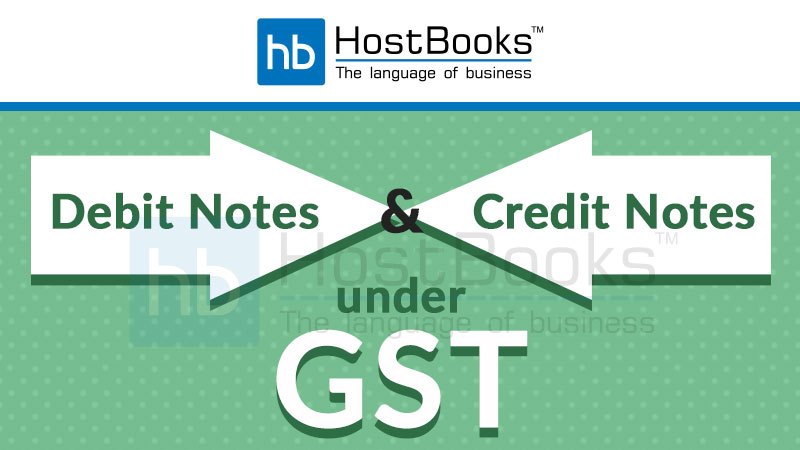What are Debit Notes & Credit Notes Under GST?

In the efforts to bring India into the category of advanced nations of the world, the advent of a new tax system had become mandatory.
And definitely, the introduction and implementation of GST in place of the old Tax system (Specially Indirect Tax) will play a significant role for the overall development of India in coming few years.
An excellent boost in Govt. revenue has been forecasted by the finance experts which will strengthen our country on the Economic front. And consequently, its abundant positive results will bring enormous benefits to every citizen and business.
Now let us discuss another important concept under GST.
“What are Debit Note and Credit Note under GST?”
With a broad view to understand this concept clearly, we ought to go a little deeper with a lucid language rather than a complicated one full of technical terms.
*What is the Purpose of creating a Debit Note/Credit Note?
Under GST regime, a Debit Note or a Credit Not can be issued either by the seller or by the purchaser (depending upon the situation) to adjust the Invoice Differences. The actual reason behind this Difference in an Invoice may vary from case to case and situation to situation.
*What are the Reasons behind creation of a Debit Note/Credit Note?
To understand the reason that cause to generate a Debit Note or a Credit Note, let us look into both the terms separately.
1- Conditions for Debit Note:-
- When the actual payable amount by the buyer to the seller increases than that of the already generated invoice; a Debit Note, in such cases, is issued by the seller to the purchaser. And the purchaser as an acknowledgment to the receipt of Debit Note issues a Credit Note.
Why So:- This can be due to excess delivery of Goods or the goods already delivered have been charged at an incorrect value.
When the actual payable amount by the buyer to the seller decreases than that in the generated invoice; a Debit Note, at this point, is issued by the purchaser to the seller. And the seller issues a Credit Note as a response or acknowledgment to the Debit Note
Why So:- This can be due to a return of goods or due to the bad quality of the goods delivered, etc.
2- Conditions for Credit Note:–
- Invoice Taxable Value is more than the Actual Taxable Amount
- Tax Charged in the Invoice is more than the actual payable Tax
- Purchaser returns the Goods to the seller
- Goods are found deficient or not as per his/her(purchaser’s) satisfaction
*What is a Debit Note?
Under the GST regime, a Debit Note is a kind of commercial instrument that is issued either by the purchaser to the supplier while returning Goods received on credit; OR, by the seller to the purchaser informing about the debt obligations/funds currently due/upcoming invoice. It contains all the essential details and the valid reason behind the same.
*What does it contain?
- The word ‘Debit Note’ must be mentioned prominently
- Supplier’s Name, Address and GSTIN
- Nature of the product/document
- Unique Consecutive Serial Number
- Date of issuance
- (in case with a registered customer/recipient) Name, Address with his/her GSTIN/UIN
- Name and Address of the recipient, (including State Name and Pin Code- if the customer is unregistered)
- Serial Number and Date of the corresponding Tax invoice (if required)
- Value of taxable supply of the goods/services, the rate of tax and amount of the tax debited or credited to the recipient
- Manual/Digital signature of the registered supplier/ representative
*What is a Credit Note?
Under the GST regime, a Credit Note is a kind of commercial instrument that is issued by one party to the another party (seller-purchaser) providing all the essential details for the amount credited to the purchaser’s account and the valid reason behind the same. In practice, it is issued by the seller in exchange for the Debit Note issued by the customer.
*What does it contain?
- The word ‘Credit Note’ must be indicated prominently
- Supplier’s Name Address and GSTIN
- Nature of the product/document
- Date of issuance
- Unique Consecutive Serial Number
- Name and Address along with customer’s GSTIN/UIN (in case with a registered customer/recipient
- Name and Address of the recipient, (including State Name and Pin Code- if the customer is unregistered)
- Serial Number and Date of the corresponding Tax invoice (if required)
- Value of taxable supply of the goods/services, the rate of tax and amount of the tax credited/debited to the recipient
- Manual/Digital signature of the registered supplier/ authorized representative
*How to create a Debit Note or a Credit Note?
HostBooks offers you the easiest, accurate and fastest solution in regards with creating either a Debit Note or a Credit Note. However, there are various software available today so choosing the latest and affordable one is highly recommended.
*How a Debit Note is different from a Credit Note on the basis of Journal Entries?
Journal Entries:
| Debit Note- | Sales Returns A/C – Debit |
| To Debtor’s A/C – Credit | |
| Credit Note- | Creditor’s A/C – Debit |
| To Goods Returned A/C – Credit |
Conclusion:- We can see it clearly that both Debit Note and Credit Note are a kind of commercial instrument/memorandum to be issued either by the purchaser to the seller ‘OR’ by the seller to purchaser with a clear view to adjust the invoice differences (if occurs due to several above-discussed conditions).
This helps to maintain transparency and authentic transaction of goods in a business dealing and simultaneously builds a healthy business relation between the customer and the supplier that ultimately helps the Government to establish and run a bold Tax procedures. And of course, it is essential if we wish to make our country a developed nation.

Try HostBooks
SuperApp Today
Create a free account to get access and start
creating something amazing right now!
















